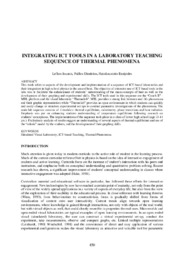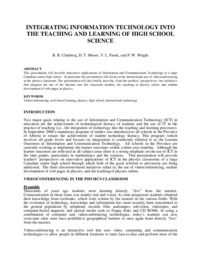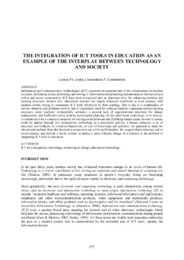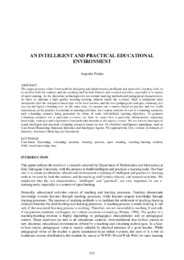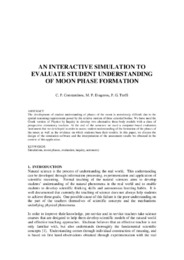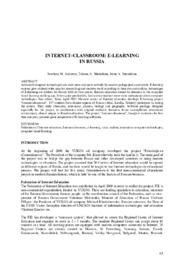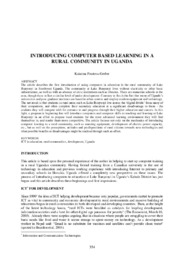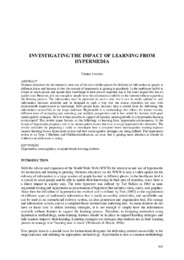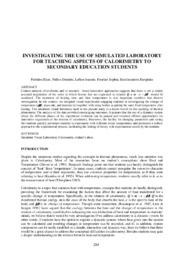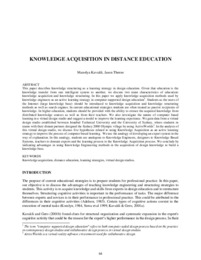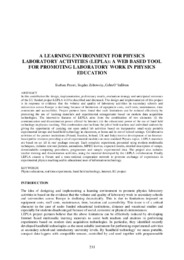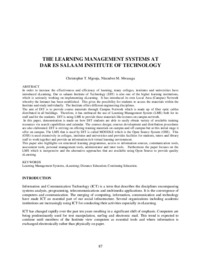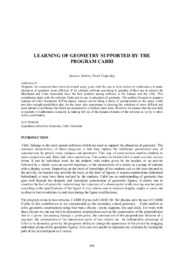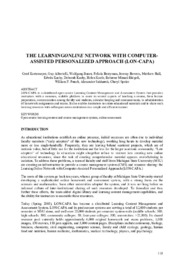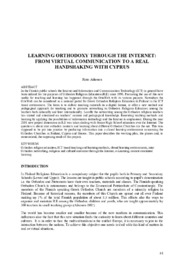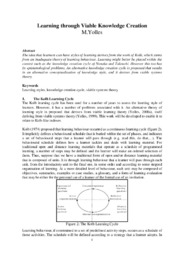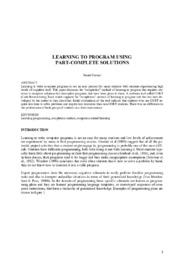Browsing Computer Based Learning in Science (CBLIS) by Title
Now showing items 154-173 of 337
-
Integrating ICT tools in a laboratory teaching sequence of thermal phenomena
(University of Zilina, 2005)This work refers to aspects of the development and implementation of a sequence of ICT based laboratories and their integration in high school physics in the area of heat. The objective of extensive use of ICT based tools ... -
Integrating information and communication Technology into teaching and learning - a Second level course for prospective teachers
(Department of Educational Sciences, University of Cyprus, 2003)Commonly, introductory-level courses on Information and Communication Technology (ICT) for prospective teachers focus on the development of knowledge and skill with the use of technology tools. These types of courses are ... -
Integrating information technology into the teaching and learning of high school science
(Pedagogical Faculty of University of Ostrava, 2001)This presentation will describe innovative applications of Information and Communication Technology in a large Canadian senior high school. In particular the presentation will focus on the instructional use of videoconferencing in ... -
The integration of ict tools in education as an Example of the interplay between technology And society
(University of Cyprus, 2007)Information and Communication Technologies (ICT) constitute an essential part of the infrastructure for modern societies, facilitating access, processing and storing of information and promoting communication between ... -
An intelligent and practical educational environment
(Department of Educational Sciences, University of Cyprus, 2003)This paper presents a Java framework for designing and implementing intelligent and practical e-learning tools, to be used by both the students and the teaching staff in their didactic and research activities, especially ... -
An interactive simulation to evaluate student understanding of moon phase formation
(Pedagogical Faculty of University of Ostrava, 2001)The development of student understanding of phases of the moon is notoriously difficult due to the spatial reasoning requirements posed by the relative motion of three celestial bodies. We have used the Greek version of ... -
Internet facilities for virtual and hands-on educational experiments
(Department of Educational Sciences, University of Cyprus, 2003)Real time computer simulators of the standard educational Physics laboratory works were designed in VRML and Java for distant learning and self-studies of University students. Experimental schemes and software were developed ... -
Internet-classroom: e-learning in Russia
(Department of Educational Sciences, University of Cyprus, 2003)Advanced computer technologies are used more and more actively by modern pedagogical community. E-learning courses give students wide area for researching and creative work according to their own curriculum. Advantages of ... -
Introducing computer based learning in a rural community in uganda
(University of Zilina, 2005)The article describes the first introduction of using computers in education in the rural community of Lake Bunyonyi in Southwest Uganda. The community at Lake Bunyonyi lives without electricity or other basic infrastructure, ... -
Investigating the impact of learning from hypermedia
(Department of Educational Sciences, University of Cyprus, 2003)Distance education via the internet is now one of the most viable options for delivery of information to people in different places and because of this the concept of hypermedia is gaining in popularity. In the healthcare ... -
Investigating the use of simulated laboratory for teaching aspects of calorimetry to secondary education students
(University of Zilina, 2005)Content analysis of textbooks and of research - based innovative approaches suggests that there is not a widely accepted negotiation of the order in which factors that are expressed in relation Q = m c should be ... -
Knowledge acquisition in distance education
(Department of Educational Sciences, University of Cyprus, 2003)This paper describes knowledge structuring as a learning strategy in design education. Given that education is the knowledge transfer from one intelligent system to another, we discuss two main characteristics of education: ... -
Labassistant: a web-based general-purpose software for the delivery and administration of computer based laboratory sessions
(Department of Educational Sciences, University of Cyprus, 2003)The design of a web-based general-purpose software system, named LabAssistant, that supports computer-based laboratory sessions is presented. The aim of LabAssistant is to provide support to the preparation, conduct, ... -
A learning environment for physics laboratory activities (lepla): a web based tool for promoting laboratory work in physics education
(University of Zilina, 2005)In this contribution the design, implementation, preliminary results, evaluation strategy and anticipated outcomes of the EU funded project LEPLA will be described and discussed. The design and implementation of this project ... -
The Learning Management Systems At Dar Es Salaam Institute Of Technology
(University of Zilina, 2005)In order to increase the effectiveness and efficiency of learning, many colleges, institutes and universities have introduced eLearning. Dar es salaam Institute of Technology (DIT) is also one of the higher learning ... -
Learning of geometry supported by the Program cabri
(University of Cyprus, 2007)Programs for computers have been developed many years with the aim to help teacher of mathematics to make education of geometry more efficient. If we criticize software according to quantity of their use in schools ... -
The learning online network with computer-assisted Personalized approach (lon-capa)
(Department of Educational Sciences, University of Cyprus, 2003)LON-CAPA is a distributed open-source Learning Content Management and Assessment System that provides instructors with a common, scalable platform to assist in several aspects of teaching a course, from lecture preparation, ... -
Learning orthodoxy through the internet: from virtual communication to a real handshaking with cyprus
(Department of Educational Sciences, University of Cyprus, 2003)In the Finnish public schools the Internet and Information and Communication Technology (ICT) in general have been utilized for the purposes of Orthodox Religious Education (R.E) since 1998. Promoting the use of this new ... -
Learning through viable knowledge creation
(Pedagogical Faculty of University of Ostrava, 2001)The idea that learners can have styles of learning derives from the work of Kolb, which stems from an inadequate theory of learning behaviour. Learning might better be placed within the context such as the knowledge creation ... -
Learning to program using Part-complete solutions
(Department of Educational Sciences, University of Cyprus, 2003)Learning to write computer programs is not an easy process for many students with students experiencing high levels of cognitive load. This paper discusses the “completion” method of learning to program that requires ...
